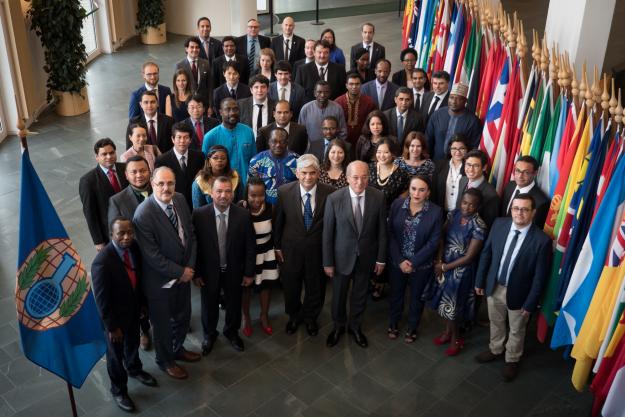
Participants of the eighteenth edition of the Associate Programme
THE HAGUE, Netherlands — 29 September 2017 – The eighteenth edition of the Associate Programme concluded successfully today at the Organisation for the Prohibition of Chemical Weapons (OPCW) Headquarters in The Hague.
During the closing ceremony for the Programme, the Director-General, Ambassador Ahmet Üzümcü, congratulated the 32 participants from 31 States Parties on successfully completing the flagship capacity-building programme of the Organisation and remarked that they are now better equipped “to further facilitate the implementation of the Chemicals Weapons Convention (CWC) in their home countries and to operate more effectively and safely in modern chemical industry environments”.
He also highlighted how the Programme has added “value to global efforts to ensure that chemical weapons never re-emerge” and, more broadly, to facilitating international technical cooperation on the peaceful uses of chemistry
Ambassador Üzümcü emphasised the important contributions made by OPCW Member States, the University of Surrey and the companies and institutions that hosted the Associates as part of their training. Additionally, the Director-General expressed his appreciation for the significant support extended to the programme by the World Customs Organization, the European Chemical Industry Council (CEFIC), the European Association of Chemical Distributors (FECC), the European Chemicals Agency (ECHA), the Dutch Customs Authorities, the City of Rotterdam and the Port of Rotterdam.
During the nine-week curriculum, the participants increased their knowledge of the CWC and various aspects of OPCW’s work. The programme included three weeks of exercises and lectures in The Hague, a three-week chemical engineering training course at the University of Surrey, UK, and three weeks of hands-on training at an industrial plant located in one of 18 facilities across 15 Member States in Europe, Asia and Latin America. During this assignment, Associates became acquainted with best practices applied in modern chemical industries.
Three States Parties — Myanmar, Niger and Togo — were represented for the first time in this year’s programme.
The other participants represented the following countries: Algeria, Bangladesh, Botswana, Brazil, Cameroon, China, Colombia, Costa Rica, the Czech Republic, El Salvador, Ethiopia, Ghana, India, Iraq, Kenya, Malaysia, Mongolia, Nigeria, Pakistan, Paraguay, Poland, Serbia, Sri Lanka, Thailand, Tunisia, Uganda, Venezuela and Zimbabwe.
The following industrial plants hosted the Associates for the three-week industrial internship: Dow Argentina (Argentina), Oxiteno (Brazil), Suatrans Emergência S.A. (Brazil), Shanghai Lianheng Isocyanate Co. Ltd (China), Bochemie a.s. (Czech Republic), DuPont Nutrition Biosciences ApS (Denmark), BASF S.E. (Germany), PT Pupuk Kujang (Indonesia), Endura S.p.A (Italy), So.g.i.s (Italy), Mitsubishi Chemical Corporation (Japan), Sumitomo Chemical Co., Ltd (Japan), Monsanto Sdn Bhd (Malaysia), Lyondell-Basell (Netherlands), Zakłady Azotowe Puławy PLC-Grupa Azoty (Poland), SABIC (Saudi Arabia), BASF S.A (Spain) and Camso Loadstar (Pvt) Ltd. (Sri Lanka).
Background
The Associate Programme is an annual capacity-building programme largely benefiting participants from developing countries and those whose economies are in transition. It provides a valuable opportunity for scientists and other professionals to be exposed to modern practices in chemical industry.
The Associate Programme boasts a dynamic group of over 400 alumni from 121 of OPCW’s Member States. The Associates Programme Alumni Association serves as a platform for exchanging views, scientific information, professional experiences and networking. The positive impact of the programme has been illustrated in the initiatives and activities undertaken regularly by alumni worldwide to support to their National Authorities and to disseminate the knowledge and expertise they gained in education and outreach events offered to government agencies, academia, laboratories and chemical industries
As the implementing body for the Chemical Weapons Convention, the OPCW oversees the global endeavour to permanently and verifiably eliminate chemical weapons. Since the Convention’s entry into force in 1997 – and with its 192 States Parties – it is the most successful disarmament treaty eliminating an entire class of weapons of mass destruction.
To date, 96 per cent of all chemical weapon stockpiles declared by possessor States have been destroyed under OPCW verification. For its extensive efforts in eliminating chemical weapons, the OPCW received the 2013 Nobel Prize for Peace.
